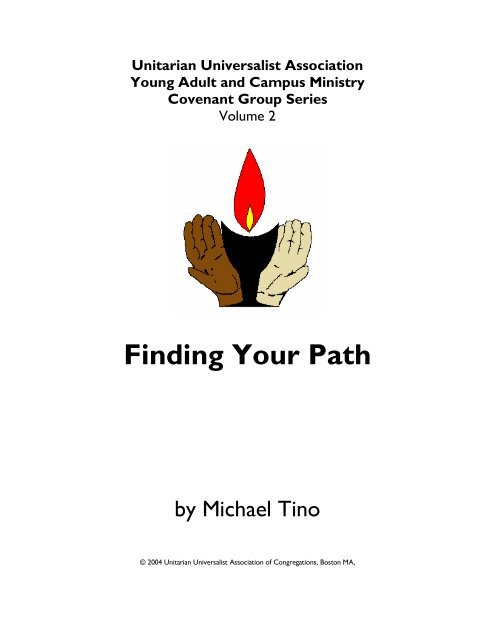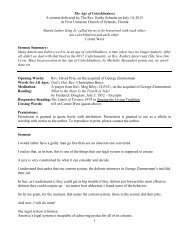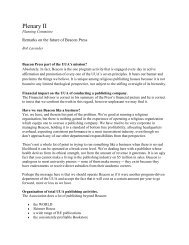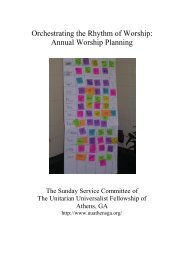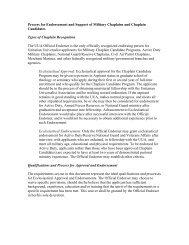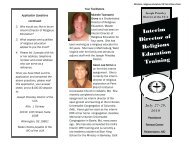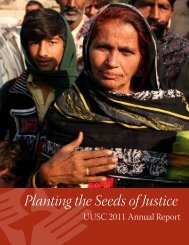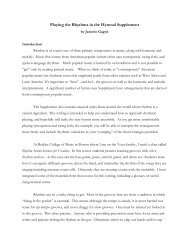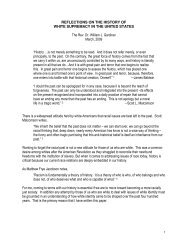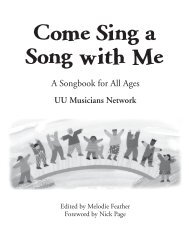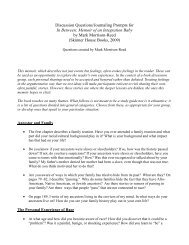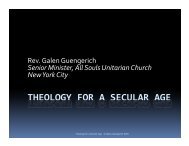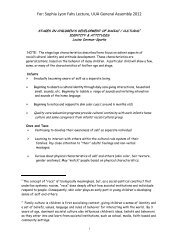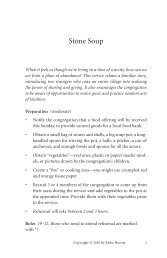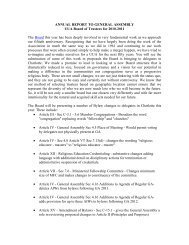Finding Your Path - UUA - Unitarian Universalist Association
Finding Your Path - UUA - Unitarian Universalist Association
Finding Your Path - UUA - Unitarian Universalist Association
Create successful ePaper yourself
Turn your PDF publications into a flip-book with our unique Google optimized e-Paper software.
<strong>Unitarian</strong> <strong>Universalist</strong> <strong>Association</strong>Young Adult and Campus MinistryCovenant Group SeriesVolume 2<strong>Finding</strong> <strong>Your</strong> <strong>Path</strong>by Michael Tino© 2004 <strong>Unitarian</strong> <strong>Universalist</strong> <strong>Association</strong> of Congregations, Boston MA,
Table Of ContentsAbout the Young Adult and Campus Ministry Covenant Group Series................................3About This Curriculum.....................................................................................................................4Opening Session: What Do You Want?........................................................................................5Session 2: Letting <strong>Your</strong> Light Shine................................................................................................8Session 3: Sparks and Flames.........................................................................................................11Session 4: What Is Important?.......................................................................................................13Session 5: Our Highest Aspirations..............................................................................................16Session 6: Know Thyself..................................................................................................................19Session 7: Perfecting Our Imperfections.....................................................................................21Session 8: Falling Naked On the Universe..................................................................................24Session 9: Hearing the Call.............................................................................................................28Session 10: Putting Faith Into Action...........................................................................................31Closing Session: Following <strong>Your</strong> <strong>Path</strong>..........................................................................................33Further Reading.................................................................................................................................36Acknowledgements..........................................................................................................................36Copyrights and Permissions...........................................................................................................37About The Author............................................................................................................................392
About the Young Adult and Campus Ministry CovenantGroup SeriesWelcome to Volume 2 of the Young Adult and Campus Ministry Covenant Groupseries. We hope that these resources will be valuable to your group, and can provideyou with program ideas and community building exercises to form deep relations amongthe members of your group.The series will continue with a number of covenant group curricula. Each curriculumwill present a series of group sessions that fit with the covenant group format in theYoung Adult and Campus Ministry Covenant Group Manual. We hope that thesecurricula will center on topics of interest to young adults—life decisions, identity issues,social justice, anti-oppression, and relationships, to name a few. There is no intendedorder to these curricula—we hope that your group will review the available choices anddecide which ones interest you the most.Please let us know if there are specific covenant group curricula you’d like to seedeveloped or if there are sessions or series that you’ve developed that you’d like toshare. This series is intended to be ongoing. While print copies of the manual andcurricula will always be available from the Office of Young Adult and Campus Ministryfor a small fee, we intend to make these resources available for free on our web site; wetrust that you will print and copy them for your group’s use only and that you will notsell them. Check the site from time to time for new curricula.Lastly, it’s important to note that the development of this manual and the entire YoungAdult and Campus Ministry covenant group series has been made possible by theCampaign for <strong>Unitarian</strong> Universalism and the Mind the Gap: Youth and Young AdultMinistry Sunday campaign.Michael TinoDirector of Young Adult and Campus Ministry<strong>Unitarian</strong> <strong>Universalist</strong> <strong>Association</strong>March 20043
About This CurriculumYoung adult life is filled with decisions and transitions. An incredible number of themost important decisions people in our society make in their lives are made betweenthe ages of 18 and 35. Choices about family, career, relationships, community andcalling are all at the forefront of our lives as young adults.One of the things that weigh heavily on the minds of many young people is the pressureto choose a career and train for it. Without a real sense of themselves, their passions,their values and their needs, young adults often choose careers for which they are illsuited,and in which they become increasingly miserable.I know—I’ve been there. At 18, I was convinced I wanted to be a scientist. Molecularand cell biology fascinated me, so it became my undergraduate major and my presumedcareer. Not until graduate school did I realize my misfit with a career in researchscience.I had to ask myself what was next. I had to find a career that fit who I was and where Ineeded to go. In doing this, I sought a lot of help. I relied on trusted advisors, I soughtnew experiences, I leaned on my community of faith. It was a few years after that whenI realized my call to the ministry. It was, to be sure, there all along—I was just notready to hear it.What would have prepared me to receive that call earlier? A chance to get to knowmyself. A chance to sit down and really understand what motivates me. A chance toconnect my passions and my values with my career aspirations.Those are precisely the chances I hope to give young adults through this covenant groupcurriculum. Through these sessions, your group will explore themselves in deep andmeaningful ways. By the end, we hope that the young adults who have completed thisexploration will have a better sense of how they are called to live their lives in theworld and that they’ve found a path for further exploration.I don’t believe that leading this curriculum calls for any special preparation beyond thegeneral training for covenant group leaders (see the Young Adult and Campus MinistryCovenant Group Manual in this series for more information on that). You need to beable to listen. You need to be able to deal with people dealing with deep and personalissues. You need to be able to move a group forward in discussion, and to know whenit’s OK to sit in silence for a while. I hope you enjoy these sessions, and I look forwardto hearing how they turn out in your group.4
Opening Session: What Do You Want?For the FacilitatorIn this opening session, it is especially important that you create community and trust.Make a proper setting for this to happen—perhaps share a meal while checking in, ormake sure you have a really comfortable and private space to meet in. Before thissession, the group should have established its covenant (see the Young Adult andCampus Ministry Covenant Group Manual for more instructions on that), so people willlikely already be somewhat familiar with one another.Opening Words/Chalice LightingCome into the circle of love and justice.Come into the community of mercy, holiness and health.Come and you shall know peace and joy.-Adapted from Israel Zangwill (Reading #418 in Singing The Living Tradition)Focus ReadingWild Night WindMichael TinoI want……a hug each morning to greet the brand new day, and one each night to bid it farewell.…to know love as vast as the sky and as pure as the first winter snow.…a sandy beach each summer to keep me cool and a blazing fire each winter to warmme.…to soar through the air like a bird, if only to remind myself of the magic and wonderof being earthbound.…a wild night wind to rustle the trees as I drift to sleep, and to call my dreams by name.I want……to feel peace deep down in the core of my being.…a babbling brook to sit by and notice the passage of time and seasons and theunfolding of life before me.…a room to call my own in which I can be free to create, to develop, to learn, or simplyto sit in a warm ray of sunshine streaming in through the window, amidst the dancingdust faeries and shadows.I want……to seek justice, simple and true, and to pass it like water for all to drink from.5
…to be wholly a part of creation, in concert with beings and mountains and trees,treating all which surrounds me as part of myself.…a compass, true and steady, to point me the way I’ve been longing to go and to helpme remember the way that I’ve been.I want……a steaming pot of Earl Grey tea to share with a friend and inspire conversation (orsimply silence, in gentle recognition that nothing needs to be said).…to stand tall and firm, proud of my accomplishments but, at the same time, humble inmy minuteness in the glory of all being.…to know God as the loving spirit in each of my breaths, transcending the boundariesof all space and time and transforming my breathing into being.And what do you want in the deepest center of your very being?What quickens your heart and shortens your breath at the mere thought of it enteringyour life?What sounds an echo in the back of your soul and enters the symphony within you likea high, insistent flute, calling your name over and over?Is it peace? Is it love? Is it harmony with all beings?Or is it a mission, a calling, a purpose?Is it a reason that you want?Or a question?Or an answer?Is it fields of purple heather swaying softly in the breezeor libraries of knowledge to satisfy your growing curiosity?Is it woolly socks in winter to keep your toes warm as you snuggle on the couchwatching the snow fallor maple trees in autumn, blazing colors bright and true like wild fire on the mountainstowards the far horizon?Is it a fountain in the summer, spraying, misting, sprinkling you with water and formingpuddles to wiggle your toes throughor a seedling in the springtime, pushing up through loamy soil and creating life from adormant shell?What is it you really want?An afternoon, a kitten, or a bicycle?Or maybe justice like the watersand pride6
and loveand wonder?A cup of tea, a ray of sun?A peaceful, quiet moment?Perhaps a hug to start each day, and one to fall asleep by,or a wild night wind that moves the treesand sparks your dreamsand lets you know possibilities without end.Questions For ReflectionWho are you? Introduce yourself to the group.What do you want?What are your dreams?How have they changed the way you live your life?What do you hope to get out of this curriculum?Closing WordsDiscipline is remembering what you want.-Attributed to David CampbellPreparing for the Next SessionThe next session is about our gifts and talents. Ask people to bring an object thatrepresents they are particularly proud of—something they made, a picture of an eventthey participated in, a prize they won, a symbol of personal triumph over adversity oroppression, etc.—and use these objects as an altar (you might want to bring adecorative cloth for the altar), or as part of check-in.7
Session 2: Letting <strong>Your</strong> Light ShineFor the FacilitatorThis session is about our talents and how we use them. If you asked participants tobring objects that represented things they were proud of, have participants arrange theobjects around the chalice (perhaps on a pretty altar cloth) as a focal point to the room.You may choose to have participants share something about their object as part of theircheck-in.Opening Words/Chalice LightingYou are the light of the world. A city built on a hill cannot be hid. No one after lightinga lamp puts it under the bushel basket, but on the lamp-stand, and it gives light to all inthe house. In the same way, let your light shine before others, so that they may seeyour good works….-Matthew 5:14-16Focus ReadingA Figment of Her ImaginationVanessa Rush SouthernMy mother’s family, immigrants from Holland, fell in love with Ella Fitzgerald. Mymother and aunts knew the entire “Ella Sings Gershwin” collection by heart. At familygatherings, we little nieces and nephews were serenaded with “A Tisket, A Tasket” andbefore long we were able to join in too.So perhaps it is no surprise that if I had a choice and could be anything in the world, Iwould not be a minister, but a jazz singer. I find some solace in the fact that there aresome similarities between the two professions. Both ministers and jazz singers sing oflife’s ups and downs. Both reach out across the dark spaces to try to connect withothers and say, “you are not alone,” and, “I have been there too.” Both wear a lot ofblack.Clearly there are differences between the professions. For one, the work hours aretotally reversed. For another, there is that nagging issue of talent.I was reminded of the talent issue just the other day. Still singing along with the stereo,I switched off the car and got out. Without Ella singing along and the big band sound inthe background to drown me out, all that could be heard in the silence and echo of theparking garage was me—a waffling voice and all those missed notes. It was then that I8
thought, as I have a thousand times before, of how much I yearn to have a voice likeElla’s.At that moment, I had a crazy thought that might pass as a revelation. What if somecrazy flip-flop were the case? I thought to myself. What if I were to find out that yearsago a beautiful jazz singer had dreamed of being me? What if, more than anything else,this singer wanted to possess the gifts and talents I possess? Indeed, what if she haddreamed me up and her highest aspirations and life-long yearnings were supposed tocome to fruition through me? How ungrateful I would be to stand here wasting mytime dreaming of being her!What would happen if each of us were to find out that we were the creation ofsomeone else’s dreams? I wonder: Would that change the way we live our lives?Would we spend less time thinking about what we don’t have or aren’t? Would wespend more time cherishing who we are? Would we approach life a bit like a treasurehunt, and spend our time looking for the gifts the dreamer had hidden in us? Perhapswe would stay awake at night, not worrying by wondering—wondering what greatworks or wonders this dreamer had made us capable of making real?So, I don’t feel so bad these days about one dream brutally brought to a close in anempty parking lot. Instead, I have decided to spend some time wondering what notesElla had in mind when she dreamed me up. I have no doubt that they are s’wonderful.Now I just need to find them.Questions For ReflectionWhat are you particularly good at?What are you proud of having accomplished?What talents do you have?How do you let your light shine in the world?9
Closing WordsGo out into the highways and by-ways.Give the people something of your new vision.You may possess a small light,but uncover it, let it shine,use it in order to bring more light and understandingto the hearts and minds of men and women.Give them not hell, but hope and courage,preach the kindness andeverlasting love of God.-John Murray (Reading #704 in Singing The Living Tradition)Preparing for the Next SessionThere is no necessary preparation for the next session, but it might be helpful to checkin with the group participants before it. As the sessions move on, the development of atrusting community will become more important, so it’s important that people attendthese early sessions, as they are easier than the following ones.10
Session 3: Sparks and FlamesFor the FacilitatorThis session focuses on what interests us—what sparks something within us, makes usenergized, lights a gleam in our eye. This can be a fun session; feel free to get creativewith it.Opening Words/Chalice LightingAt times, our own light goes out and is rekindled by a spark from another person. Eachof us has cause to think with deep gratitude of those who have lighted the flame withinus.-Albert Schweitzer (Reading #447 in Singing The Living Tradition)Focus ReadingHow WonderfulHoward ThurmanHow wonderful it is to be able to feel things deeply!The sheer delight of fresh air when you have been indoors all day;The never ending wonder of sunrise and sunset;The sound of wind through the trees and the utter wetness of the rain;The excitement of finding something that was lost and is found:My fountain pen,A beautiful word forgotten,The return of an old book,The reconciliation after estrangement,The first step after months of illness.How moving is the sheer wonder of being necessary to the life of another?The source of food for a dog, a cat;The giving of a gentle word when you did not know that such a word wasdesperately needed;The sharing of so little at the crucial point of acute urgency;The invasion of the mind and heart with a sense of Presence in which all of one’sbeing suddenly becomes God’s dwelling place.11
Questions For ReflectionWhat sparks a flame within you?What do you feel deeply?What gives you energy?What sparks your interest or curiosity?Talk about an everyday moment that renewed your spirit or made you feel good.Are there things you’re interested in trying?Closing WordsThe ThreadDenise LevertovSomething is very gently,invisibly, silently,pulling at me—a threador a net of threadsfiner than cobweb and aselastic. I haven’t triedthe strength of it. No barbed hookpierced and tore me. Was itnot long ago this threadbegan to draw me? Orway back? Was Iborn with its knot about myneck, a bridle? Not fearbut a stirringof wonder makes mecatch my breath when I feelthe tug of it when I thoughtit had loosened itself and gone.Preparing for the Next SessionThe next session is the first of two that ask participants to clarify their values. Session 6asks participants to focus on what is most important to them. Ask them to think aboutthis in advance, and, if they keep one, to look through their calendars/planners to seewhat they spend their time doing.12
Session 4: What Is Important?For the FacilitatorThis session focuses on what is important, and asks participants to compare what theysay is important to them with what they actually do. If participants looked through theircalendars, they might have more to share—don’t make the analysis of calendars thefocus of this exercise, it’s just a tool to help people understand that they should bespending time on what is important to them…and that they might be spending moretime on things that others say is important instead.Opening Words/Chalice LightingCome into this place of peaceand let its silence heal your spirit;Come into this place of memoryand let its history warm your soul;Come into this place of prophecy and powerand let its vision change your heart.-William F. Schulz (Reading #429 in Singing The Living Tradition)Focus ReadingExcerpt from Living On PurposeA sermon by the Rev. Dr. Arvid StraubeWe need to find our hope. Because those feelings of despair disempower us and keepus from doing those things that we can do.For decades in South Africa, people were jailed, killed, repressed, as they protestedApartheid. They must have lost hope, and they must have been tempted to despair.But they kept on in the face of oppression and danger, year after year, decade afterdecade, each making their choices to resist this injustice, doing what they could. Andone day, unexpectedly, Apartheid was no more in South Africa.For decades, people had been imprisoned and silenced, their rights had been denied, allover eastern Europe, including our <strong>Unitarian</strong> brothers and sisters in Romania. Theirrights to religious worship were denied under a brutal system of communism. Butpeople kept on asserting their rights, people kept on working for change, decade afterdecade with no break. And then one day, one night, overnight, the Berlin wall came13
down. And it’s all people making decisions about what they could do to resist, andgetting together and working together.There’s a tipping point. And we don’t know when it is. And it’s important toremember, as the great rabbi Hillel said, who might have been Jesus’ teacher, thousandsof years ago, “In a world where no one is behaving as a human being, you must behave asa human being.” More than that. We must behave out of our deepest humanity. Wemust become peacemakers. Now there are a lot of things we can do in the outer worldto create a world of peace and justice, but I am absolutely convinced that the mostimportant thing we can do for peace and justice, the most important thing we can do tobring about the kind of world that we dream of, is inner transformation. . . bringingforth within individual hearts and mind the seeds of wisdom, compassion, love andpeace. There is no more urgent task, and your consciousness is your responsibility.So how do you do that? You don’t have to go off to Tibet and sit in a cave with yourlegs tied in a knot. You don’t have to have a great vision, seek some esoteric teacher.They way to be a peacemaker is very simple to understand. But it’s difficult to do. Thefirst thing is to treat everyone you meet with kindness and respect. And that means theclerk at the store, the waitperson at the restaurant. Yes, there’s even a way to hang upon telemarketers kindly and with respect. There is. And that includes the peopleclosest to you. <strong>Your</strong> families and friends. To treat them kindly and with respect. That’sthe way to become a peacemaker. Easy to understand, difficult to do.The second way is to be quick to forgive. Because we’re going to fail at this. We’re onlyhuman. To be quick to forgive. To forgive ourselves and to forgive others. Becausewar is the result of people holding onto anger and seeing the other person through a setof ideas and not realities. Being quick to forgive is the way to be a peacemaker.And it’s important, too, to find a time in our lives to be silent, and to listen. To listen toour deepest heart, to life, to God, in whatever form that takes—prayer or meditationor just a quiet time. That’s the way to become a peacemaker.Now some of you have heard this many times so forgive me, but the way to become apeacemaker has to do with what you do with your time and what you do with yourmoney. If you want to know what you really believe, not what you think you believe,not what you tell people at parties you believe, but if you want to know what you reallybelieve, what kind of values you really hold, what kind of world you really want, there’sa quick inventory you can do. You can look in your checkbook or its electronicequivalent, and you can look in your date book or its electronic equivalent, and you cansee what it is you spend your time and money on. Are you giving those preciousresources of your life in the service of the kind of world that you say you believe in?That is a matter of small decisions every day.14
Questions For ReflectionWhat activity would be hardest for you to live without?What is most important for you to do to feel whole—like you’re living out yourpurpose in the world?Are there things that others tell you should be important to you?Which of these things do you agree with? Disagree with? Why?What do you spend most of your time doing?How can you spend more of your time doing things that are important to you?Closing WordsWhatever is true, whatever is honorable,Whatever is just, whatever is pure,Whatever is pleasing, whatever is commendable,If there is any excellence and if there is anything worthy of praise, think about thesethings.-Philippians 4:8Preparing for the Next SessionThe next part of values clarification is identifying what we hope for—which of ourdreams and aspirations are most important. This might help participants understandwhat should be a priority in their life if they want to achieve these aspirations. Youmight ask participants to write down a story (less than one page) of something they’vealways wanted to do, and to share that story for check-in. It’s also that point in thecurriculum where you need to check in with every member of the group. Just find outhow they’re doing, what space they’re in, and if they have needs that your faithcommunity can help them address.15
Session 5: Our Highest AspirationsFor the FacilitatorThis session focuses on what participants aspire to do and be, and requires a somewhatsafe space if participants are going to risk saying things that might not be popular orexpected. Be sure to create that space here. If participants brought a story aboutsomething they’ve always dreamed of doing, you might weave those stories into thecheck-in, or into the first round of sharing after the focus reading. Be careful not to letthis go on for too long.Opening Words/Chalice LightingMay we be reminded here of our highest aspirations,and inspired to bring our gifts of love and service to the altar of humanity.May we know once again that we are not isolated beingsbut connected, in mystery and miracle, to the universe,to this community and to each other.-Anonymous (Reading #434 in Singing The Living Tradition)Focus ReadingEverywhere IncarnateRev. David E. BumbaughHumanism believes that man is a part of nature and that he has emerged as a result of acontinuous process.— Humanist Manifesto I (1933), Second AffirmationWhen the Humanist Manifesto declared that we are part of nature and have emerged asthe result of a continuous process, it not only denied the creation stories of thewestern religious traditions: It gave us an immensely richer, more complex history-onerooted in a system which invites not blind faith but challenge, correction andamendment, one which embraces "truth, known or to be known." It also gave us alanguage of reverence because it provided us a story rooted not in the history of asingle tribe or a particular people, but a history rooted in the sum of our knowledge ofthe universe itself.It gave us a doctrine of incarnation which suggests not that the holy became human inone place at one time to convey a special message to a single chosen people, but thatthe universe itself is continually incarnating itself in microbes and maples, inhummingbirds and human beings, constantly inviting us to tease out the revelationcontained in stars and atoms and every living thing. A language of reverence for16
Humanists begins with understanding this story as a religious story-a vision of realitythat contains within it the sources of a moral, ethical, transcendent self-understanding.We are driven to recognize a paradox: our sense of separateness is ultimately anillusion, yet our individual separateness is a consequence of the drive of the universe fordifferentiation and complexity. We are driven by our story to seek an ethic thatrespects the individual and the ground out of which the individual emerges. This impliesa deep concern for ecological justice that reaches across class, racial, ethnic, evenspecies distinctions and embraces a vision that responds to the largest sense of self weare capable of entertaining.If the Manifesto was right to insist that we are part of nature, not separate from it, thatwe represent a continuing natural process, then it becomes clear that the challenges, thehopes, the dreams, the aspirations which find expression in our lives are not separatefrom the context in which we have evolved, in which we are rooted. We are notencapsulated, separated, isolated beings. Whatever we are, the universe is. The realityinside of us and the reality outside of us are ultimately one reality.In us the universe dreams its dreams. In us the universe struggles for a moral vision. Inus the universe hopes for new possibilities. In us the universe strives for selfunderstanding.In us the universe seeks the meaning of existence.Questions For ReflectionWhat is it that you’ve always dreamed of doing?What do you aspire to be?What one thing do you hope people will say about you at your memorial service?Who will support you in getting there?What communities and relationships do you have that have helped you realize yourdreams?How do you experience your connection to the dreams of others?17
Closing WordsWhy should we live in such a hurry and waste of life?We are determined to be starved before we are hungry.I wish to live deliberately, to front only the essential facts of life.I wish to learn what life has to teach, and not, when I come to die, discover that I havenot lived.I do not wish to live what is not life, living is so dear,Nor do I wish to practice resignation, unless it is quite necessary.I wish to live deep and such out all the marrow of life,I want to cut a broad swath, to drive life into a corner, and reduce it to its lowestterms.If it proves to be mean, then to get the whole and genuine meanness of it, and publishits meanness to the world;Or if it is sublime, to know it by experience, and to be able to give a true account of it.-Henry David Thoreau (Reading #660 in Singing The Living Tradition- can be readresponsively if you have enough hymnals)Preparing for the Next SessionThe next session is about knowing your personal preferences and personality. If peoplehave used instruments such as the Myers-Briggs Type Indicator or the Enneagram tolook at their personality types, you might ask them to think about what they learnedfrom that analysis, but don’t ask them to talk about the jargon of the particular systemthey like. Perhaps participants will want to take a workshop on one of these systems inorder to get to know themselves better—you might do a bit of research and comeprepared to the next session with some places in your community where suchresources are available (or web sites, even).18
Session 6: Know ThyselfFor the FacilitatorThis session is about knowing your personality and your personal preferences—for howyou communicate, for how you work, for how you interact with others in a variety ofways. While personality-type indicators such as the Myers Briggs Type Indicator or theEnneagram are useful in the quest for self-knowledge, they all have their weaknesses andtheir misuses, so I strongly suggest that you not get into them here. You might referpeople to workshops in your community if they’re interested in pursuing such anoption. The focus reading was chosen specifically to get people out of the analyticalpersonality-test frame of mind and into a gut feeling level—try to stay there.Opening Words/Chalice LightingKnow thyself. Let each consider that whilst he is occupied in meek yet perseveringreflexion upon his duty, privately comparing his own thoughts in the sincere wish toknow what is true and what is right for him, he is really advancing in the scale of being.-Ralph Waldo EmersonFocus ReadingCat People and Dog PeopleJane Ellen MauldinThere are two kinds of people in this world: cat people and dog people. I tried to be acat person not long ago. My family even bought a house that came equipped with itsown cat, a pretty white kitten that had been abandoned by its previous owners. Weimmediately adopted her and tried to love her. But cats, as Snowflake immediatelynotified me, allow them selves to be loved only on their own terms and at their owndiscretion.Cat people, Snowflake reminded me, must have a strong sense of who they are, and beable to nurture themselves. They must be able to appreciate radical individualism. Catpeople (forgive me if I slander) must also find some perverse satisfaction in lovingsomeone who will never love them back.It must be clear by now that I am, and always will be, a dog person. After putting upwith our family for a year, Snowflake departed our neighborhood. Her leaving maderoom in our family psyche for what the children and I had long desired: a dog.The newest addition to our family is a beautiful English springer spaniel named Hanna.She loves her people pathetically, licking my toes if I will let her. She begs to be around19
us, and is miserable when we are gone for any length of time. She desperately needs us,and we dog people, who want to be needed, eat it up.As a solid dog person since age four, I can say honestly that dog people are deeplyinterdependent. We need to be needed; we want to be slobbered over! We lovecavorting like children and whispering sweet nothings to adoring eyes. There is nothingquite like the complete devotion of a dog, and we love it.This world needs both kinds of people: cat people, who are able to work independentlyand quietly, content to know they are making a solid difference in the PTA, church orsynagogue, and dog people, who make lots of noise, organize ball games, frolic withchildren, and tell everyone how wonderful they are.However, the next time a stray cat comes to my house, I won’t try to change my basicnature. I’m calling a cat person to come take it off my hands.Questions For ReflectionHave you ever felt stuck in a job (volunteer or paid) that didn’t fit your personality?How did it feel?How would you describe your personality?How would you describe how you interact with others?Are you a cat person or a dog person, as Jane Ellen Mauldin would describe you?What would be your ideal work environment? Home environment?Closing WordsHe who knows others is wise. He who knows himself is enlightened.-Lao-tzuPreparing for the Next SessionIf you desire, bring some jazz music as a meditation background for use in the nextsession. Those of you familiar with the work of Sharon Welch (Sweet Dreams InAmerica: Making Ethics and Spirituality Work) will understand that jazz is a powerfulmetaphor for being able to make mistakes in community—and the next session is aboutlearning to love and live with our weaknesses. Consider reading Welch’s book (at leastthe first chapter of it) as background before the next session, or even having copiesavailable for group participants to read.20
Session 7: Perfecting Our ImperfectionsFor the FacilitatorThis session is one of the hardest in the curriculum, as it asks people to talk about theirweaknesses and experiences overcoming obstacles and adversity; it also asks people tothink about times when they’ve needed help, which is not always easy to do. Beprepared to do have pastoral counseling available for people after this session from aminister or trained professional.You might consider in this session having a brief meditation after the chalice lighting orthe focus reading. I would suggest, in keeping with Sharon Welch’s theme, that you usejazz music as the background to this meditation.Opening Words/Chalice LightingThe innovation, creativity, power, precision, beauty, and responsiveness that heal andaffect people’s lives…in positive ways may emerge as readily from ouracknowledgement and check to each others’ constitutive weaknesses as from buildingon each others’ strengths.-Sharon Welch, from Sweet Dreams In America: Making Ethics and Spirituality WorkFocus ReadingThe Cracked Potauthor unknownA Water Bearer in India had two large pots, each hung on one end of a pole that hecarried across his neck. One of the pots had a crack in it, and while the other pot wasperfect and always delivered a full portion of water at the end of the long walk from thestream to the master's house, the cracked pot arrived only half full. For a full two yearsthis went on daily, with the bearer delivering only one and a half pots full of water to hismaster's house.Of course, the perfect pot was proud of its accomplishments, perfect to the end forwhich it was made. But the poor cracked pot was ashamed of its own imperfection, andmiserable that it was able to accomplish only half of what it had been made to do.After two years of what it perceived to be a bitter failure, it spoke to the Water Bearerone day by the stream. "I am ashamed of myself, and I want to apologize to you.""Why?" asked the bearer, "What are you ashamed of?"21
"I have been able, for these past two years, to deliver only half my load because thiscrack in my side causes water to leak out all the way back to your master's house.Because of my flaws, you have to do all of this work, and you don't get full value fromyour efforts," the pot said.The Water Bearer felt sorry for the old cracked pot, and in his compassion he said, "Aswe return to the master's house, I want you to notice the beautiful flowers along thepath."Indeed, as they went up the hill, the old cracked pot took notice of the sun warming thebeautiful wild flowers on the side of the path, and this cheered it some. But at the endof the trail, it still felt bad because it had leaked out half its load, and so again itapologized to the bearer for its failure.The bearer said to the pot, "Did you notice that there were flowers only on your sideof your path, but not on the other pot's side? That's because I have always known aboutyour flaw, and I took advantage of it. I planted flower seeds on your side of the path, andevery day while we walk back from the stream, you've watered them. For two years, Ihave been able to pick these beautiful flowers to decorate my master's table. Withoutyou being just the way you are, he would not have this beauty to grace his house."Each of us has our own unique flaws. We're all cracked pots. But if we will allow it,these flaws can be used to grace another's table. In the great economy of the universe,nothing goes to waste. So as we seek ways to minister together, and as you are called touse your gifts, don't be afraid of your flaws. Acknowledge them, and allow them to be apart of your beautiful wholeness, and you, too, can be the cause of beauty along thepathways of others. Go out boldly, knowing that in our weakness there is ultimatelystrength, beauty and purpose.Questions For ReflectionHow have you overcome adversity in your life? What did you learn from this process?What are some of your weaknesses, and how have you learned from them?What helps you be more compassionate to others in their time of need?How have you helped others with things that they needed help doing? What did it feellike to help?How have others helped you when you couldn’t do something yourself? What did itfeel like to be helped?22
Closing WordsOne who gains strength by overcoming obstacles possesses the only strength that canovercome adversity.-Albert SchweitzerPreparing for the Next SessionConsider asking people to bring objects to the next session that represent a time whenthey did something they thought they could not. If you do this, bring a pretty cloth tomake an altar space for the objects and the chalice.23
Session 8: Falling Naked On the UniverseFor the FacilitatorThis session focuses on fear and trust. Fear is one of the major obstacles to pursuingour dreams and hearing our call; trust is the major way we develop the courage to faceour fears. Keep in mind that the main objective of this session is to help participantsidentify those support systems in their lives—family (biological or chosen), friends,congregations, etc—that can help them develop a sense of trust. This session is meantto empower participants to do things that they otherwise think they cannot, and this isthe sense they should be left with after the session.If participants brought objects, place them around the chalice on top of a pretty cloth tomake an altar. Participants can weave explanations of the objects into the discussion inthe second part of the session as they wish to.Opening Words/Chalice LightingTrustDavid O. Rankin, from Dancing in the Empty SpacesWhen I trust:I am able to engage in the process of discovering who I am and of creating what I willbecome.I am able to function honestly and naturally without masks, defenses and deceptions.I am able to reveal hidden desires and inner weaknesses without fear of criticism.I am able to focus on constructive projects rather than brooding over imagined wrongs.I am able to join in authentic relationships, in intimate sharing, and in personal dialogue.I am able to appreciate the nature of others for what they do and what they are.I am able to act in freedom with little regard for status, power, authority, ormanipulation.I am able to take risks, sail on fresh adventures, and explore the dark regions of theworld.I am able to touch the springs of consciousness and to see the inherent potential of life.Trust is saying “Yes” to creation.24
Focus ReadingHow Superman Taught Me To TrustMichael Tino“Fly. Don’t look, just fly.” Many friends who have inquired about the source of thisquote—one of my favorites—have been surprised to learn that this major source ofinspiration in my life were the words of an airplane pilot to his co-pilot in Superman:TheMovie, after the Man of Steel himself had single-handedly saved the imperiled plane fromplummeting out of the sky. Sure, it may seem funny that so much inspiration mighthinge on five words of an unmemorable scene from a movie based on a comic book. Toa six year-old child, though, those words meant a whole lot.When I was six, those words meant that I didn’t always need to understand why thingshappened the way they did. They meant that I could do something illogical—evenunexpected—and have it turn out fine, because it was the right thing to do at the time.Fly a jet plane with one engine? Sure, if Superman is under the wing.“Fly. Don’t look, just fly.” Five words spoken to a nervous co-pilot by his mentor, histeacher, his boss. Five words which meant a lot to an enthralled six year-old: Go aheadand do it. Trust me that it will be OK. Trust me that something, someone is holding upyour wings and making sure you don’t fall. Don’t be afraid. Fly.These words have become permanently lodged in my brain, coming to the surface fromtime to time to give me the courage to take some important—and risky—steps in mylife. For a long time, this has been the voice I hear whenever I am afraid.Fear is often a healthy reaction to danger. Fear lets us know when we’re pushing ourboundaries, and is a natural reaction to growth and change. Because of this, fear is auseful emotion: fear properly identified can let us know exactly what we need to pushourselves to do. As Eleanor Roosevelt once said, “you must do the thing you think youcannot do.”And while fear is overcome with courage, courage is an often-misunderstood trait. Wetend to think that acting with courage means not being afraid at all. Instead courage,rather than being the absence of fear, is the ability to be afraid and still act.Courage is not easy. To act despite one’s fears goes against all that fear represents.This is why the key to courage in my experience has always been trust. Trust that if Itake a calculated risk, things will be OK. My friend Bob once described his enormouscourage in making a dramatic career change as “falling naked on the universe andtrusting that it will catch me.” That’s a lot of what taking a risk is, isn’t it? Trusting thatno matter how big the leap is, the landing will be soft. Trusting that the universe, yourGod or Goddess, your family, your congregation, or your community of supportivefriends and loved ones, will be watching out for you as you step into the unknown.25
We need to learn to live our lives with trust. To me, trust is built through living inrelationship with one another. By forming intentional, supportive communities, bylistening and appreciating other people, and by being present with each other, we createthe trust that allows us each to try, knowing that if we fail, everything will be all right. Increating trusting relationships with others around us, we know that we will be caughtshould we fall because we are living always ready to catch someone else—or at least tohelp them up, dust them off, and make sure they’re OK.You have more experience with trust than you might think. It is, in fact, inherent ineach of our lives. Each of us lives our life wholly dependent on the things and peoplearound us. To live in this world is to trust those things we cannot control—toacknowledge them and to go on in spite of them, sometimes because of them. And thetruth is that not one of us here today knows exactly what will happen when we leave,what will come tomorrow, or next month, or next year.So life itself, however aimless, takes trust. If we combine that with purpose andcourage, we can gather the strength to do what we need to change our lives—to liveout our values, to break out of our ruts, to try something new and bold and risky, tolive the lives that we’ve imagined for ourselves.So fly, my friends. Don’t look, just fly. It probably won’t be Superman holding up yourwings, but if you act with purpose, confidence, courage and trust, you will soar.Questions For ReflectionHave you ever done something you thought you could not do?What are you afraid of?What does “courage” mean to you?How have your fears stopped you from living up to your potential?How can being part of a community help you take risks?Who do you rely on for support in your life?How does that support help you develop courage?What do you need in order to trust?26
Closing WordsI’ve been absolutely terrified every moment of my life and I’ve never let it stop me fromdoing a single thing I wanted to do.-Georgia O’KeeffePreparing for the Next SessionThere is no particular preparation for the next session other than to ask people to thinkabout what they’ve discovered in this class so far, and to ponder the following question:What might they have been keeping inside that takes all of these things into account?It’s also time once again to check in with all of the participants in the group. These lasttwo sessions have likely been somewhat intense, and they might need individual debriefsbefore going on to the portion of the curriculum where they will be asked to synthesizeall that you’ve been talking about.27
Session 9: Hearing the CallFor the FacilitatorThis session encourages people to hear the song that is made when their gifts are usedto meet the needs of the world. It is especially important to have sacred, safe space aspeople make these connections.Opening Words/Chalice Lighting<strong>Your</strong> gifts—whatever you discover them to be— can be used to bless or curse theworld.The mind’s power,the strength of the hands,the reaches of the heart,the gift[s] of speaking, listening, imagining, seeing,waitingany of these can serve to feed the hungry,bind up woundswelcome the stranger,praise what is sacred,do the work of justiceor offer love.Any of these can draw down the prison door,hoard bread,abandon the poor,obscure what is holy,comply with injustice,or withhold love.You must answer this question:What will you do with your gifts?Choose to bless the world.-Rebecca Parker28
Focus ReadingListening for Our SongDavid S. BlanchardOn sabbatical in East Africa, I heard a story of a people who believe that we are eachcreated with our own song. Their tradition as a community is to honor that song bysinging it as a welcome when a child is born, as comfort when the child is ill, incelebration when the child marries, and in affirmation and love when death comes.Most of us are not welcomed into the world in that way. Few of us seem to know oursong.It takes a while for many of us to figure out which is our song, and which is the songthat others would like us to sing. Some of us are slow learners. I heard my song notnecessarily from doing extraordinary things in exotic places, but also from doing somepretty ordinary things in routine places. For every phrase I heard climbing Kilimanjaro, Ilearned another in a chair in a therapist’s office. For every measure I heard in thesilence of a retreat, I heard another laughing with my girls. For every note I heard in thewind on the beach at Lamu, I gleaned more from spending time with a dying friend asher children sang her song back to her. What came to astound me was not that thesong appeared, but that it was always there.I figure that the only way I could have known it for my own was if I had heard it before,before memory went to work making sense and order out of the mystery of ourbeginning. Our songs sing back to us something of our essence, something of our truth,something of our uniqueness. When our songs are sung back to us, it is not aboutapproval, but about recognizing our being and our belonging in the human family.It is good to know our songs by heart for those lonely times when the world is notsinging them back to us. That’s usually a good time to start humming to yourself, thatsong that is most your own.They can be heard as songs of love or of longing, songs of encouragement or ofcomfort, songs of struggle or of security. But most of all, they are the songs of life,giving testimony to what has been, giving praise for all we’re given, giving hope for all westrive for, giving voice to the great mystery that carries each of us in and out of thisworld.29
Questions For ReflectionHow do you use your gifts in service to others?How do you bless the world?If you would like one thing to be said about you at your funeral (many many years in thefuture, we hope), what would it be?What is your purpose in the world?What gets in the way of hearing your song—the essence of who you are and how youare meant to be a part of society?Closing WordsI have spent my days stringing and unstringing my instrument while the song I came tosing remains unsung.-Rabindranath TagorePreparing for the Next SessionAsk participants to think about how they aspire to live their faith—how their valuesshow in the things they do everyday. This is what the next session will be about. Youmight ask them to recall the discussions in sessions 6 and 7, when you talked aboutvalues and aspirations.30
Session 10: Putting Faith Into ActionFor the FacilitatorThis section specifically asks people to name those places where they can and do liveout their values in the world. This might be a session you can follow up with some sortof group action, or service project. This would be a good idea if you have a group that’seager to do something together outside of group time.Opening Words/Chalice LightingThey shall build up the ancient ruins,they shall raise up the former devastations;they shall repair the ruined cities,the devastations of many generations.-Isaiah 61:4Focus ReadingWhat good is it, my brothers and sisters, if you say you have faith but do not haveworks? Can faith save you? If a brother or sister is naked and lacks daily food, and oneof you says to them, “Go in peace, keep warm and eat your fill,” and yet you do notsupply their bodily needs, what is to good of that? So faith by itself, if it has no works, isdead. But someone will say, “You have faith and I have works.” Show me your faithapart from your works, and I by my works will show you my faith.For just as the body without the spirit is dead, so faith without works is also dead.-James 2:14-18,26Questions For ReflectionHow do you live out your values in the world?What needs do you see in your community that you long to fill?Has there been a time in your life that you’ve done something that made you feel likeyou made a real difference? Tell us about it.31
Closing WordsPeople say, what is the sense of our small effort.They cannot see that we must lay one brick at a time, take one step at a time.A pebble cast into a pond causes ripples that spread in all directions. Each one of ourthoughts, words and deeds is like that.No one has a right to sit down and feel hopeless.There is too much work to do.-Dorothy Day (Reading #560 in Singing The Living Tradition)Preparing for the Next SessionConsider following up this session with a group service project. Perhaps groupmembers can agree on something they would like to do together to live out their valuesin the community—whether in your town or city, in your congregation or on yourcampus. There are many different ways this can be done, from letter-writing campaignsto elected officials to feeding the homeless. Be creative and encourage group discussionabout this.The final session of this curriculum asks participants to make plans and move forwardwith them. Gauge if participants are ready to do this by checking in with them beforethe next session. You might want to make the last session bigger than just the meeting.Perhaps a potluck dinner is in order, or a meal out together after the meeting.32
Closing Session: Following <strong>Your</strong> <strong>Path</strong>For the FacilitatorThis is the last session, and should be fairly light. While it gets at some of the sameissues that the previous session did, this is not the time to push people. Perhaps,though, some of your pushing from last week will bear fruit here. Be prepared for that.Opening Words/Chalice LightingRoadsJoy CowleyI enjoy looking at other people’s roads.They are different from mineand yet basically the same.They all facilitate journeyfrom here to there,from self to other,and they are all interconnected.The fact that I love my own roadwith its comfortable landmarksand familiar faces,doesn’t restrict my appreciationfor someone else’s neighbourhood.And if I go into another areaand walk a mile or two with someone else,I return as a larger being.The love of my own road is deepened,the appreciation of other roads is widened,and I am blessed with the knowledgethat all roads lead to God.33
Focus ReadingSong of the Open RoadWalt Whitman (Reading #645 in Singing The Living Tradition)Afoot and light-hearted, I take to the open road,healthy, free, the world before me.Henceforth I ask not good fortune—I myself am good fortune;strong and content,I travel the open road.I inhale great draughts of space,the east and the west are mine,and the north and the south are mine.All seems beautiful to me;I can repeat over to men and women,You have done such good to me,I would do the same to you.Whoever you are, come travel with me!However sweet these laid-up stores—however convenient this dwelling, we cannotremain here;However sheltered this port, and however calm these waters, we must not anchorhere;Together! the inducements shall be greater;We will sail pathless and wild seas;We will go where winds blow, waves dash, and the Yankee clipper speeds by under fullsail.Forward! after the great Companions!and to belong to them!they too are on the road!Onward! to that which is endless,as it was beginningless,to undergo much, tramps of days, rests of nights,To see nothing anywhere but what you may reach it and pass it.To look up or down no road but it stretches and waits for you—To know the universe itself as a road—as many roads—as roads for traveling souls.34
Questions For ReflectionWhat have you gained from being here with us for this time?What is next on your path?How can we help you take the next step?Closing WordsBeauty is before me, andBeauty behind me,above me and below mehovers the beautiful.I am surrounded by it,I am immersed in it.In my youth, I am aware of it,and, in old age,I shall walk quietly the beautiful trail.In beauty it is begun.In beauty, it is ended.-From the Navajo people of North America (Reading #682 in Singing The Living Tradition)Preparing for the Next SessionYou might be surprised to even find this section here, as there is no next session in thiscurriculum. The group, however, might want to go on, with or without anothercurriculum. It’s important to check in with all of them to see what comes next.Perhaps you can do this as a final meeting, or a meal together, or just in individual phonecalls or meetings.35
Further ReadingTrumbauer, Jean Morris. Created and Called. (Minneapolis: Augsburg Fortress Publishers, 1999)Welch, Sharon.Routledge, 1999)Sweet Dreams In America: Making Ethics and Spirituality Work. (New York,Beard, Margaret L. and Roger W. Comstock, eds. All Are Chosen: Stories of Lay Ministry andLeadership. (Boston: Skinner House Books, 1998)Bolles, Richard N. What Color Is <strong>Your</strong> Parachute? (Berkeley, Ten Speed Press, published annually)AcknowledgementsThere are many people whose inspiration and support have made this curriculum possible.Among my current and former colleagues on the <strong>UUA</strong> staff, I wish to thank Robert CavenaughKeithan, for believing in small group ministry among young adults; the fine folks I’ve had thechance to work with in the Office of Young Adult and Campus Ministry—Joseph Lyons, LaurelAlbina, Erik Kesting and Jesse Jaeger (now Youth Programs Director); advisors and educators inthe Staff Group for Lifespan Faith Development for sharing their vision of a lifespan corecurriculum; my colleagues in the Staff Group for Congregational Services; and Peter Bowden,former staff person in the Youth Programs Office, for reminding me how much youth groupsand covenant groups have in common.At my home congregation, I thank my mentor and minister, Rev. Dr. Arvid Straube for hisinspiration and guidance, my friend and colleague Kate Beasley for reminding me that I deserve ajob I can’t believe they pay me to do, the many people who gave me on-the-ground experiencewith small group ministry, and Bob Slentz-Kesler for his beautiful imagery of what it’s like totrust.And from the rest of my life, I thank my partner, Eric Dyer, for his support and love, mywonderful parents and brothers, my friends at the Meadville/Lombard Theological School whohave been there as I progress in my ministerial formation, and all of those who have encouragedme to find my path.36
Copyrights and PermissionsThe quotations contained herein from the Hebrew and Christian Scriptures are from the NewRevised Standard Version Bible copyright © 1989 by the Division of Christian Education of theNational Council of the Churches of Christ in the U.S.A. Used by permission. All rightsreserved.I gratefully acknowledge the following individuals and publishers who have granted permissionfor use of their copyrighted material.Session 2“A Figment of Her Imagination,” from This Piece of Eden: Meditations by Vanessa Rush Southern(a <strong>UUA</strong> Meditation Manual published by Skinner House Books, Boston MA). Copyright © 2001by Vanessa Rush Southern. Reprinted by permission of the author.Session 3“How Wonderful,” from Meditations of the Heart, by Howard Thurman. Copyright © 1953,1981 by Anne Thurman. Reprinted by permission of Beacon Press.“The Thread” (excerpt) by Denise Levertov, from Poems 1960-1967 by Denise Levertov.Copyright © 1966 by Denise Levertov. Reprinted by Permission of New Directions PublishingCorp.Session 4Reading by Rev. Dr. William F. Schulz, reprinted by permission of the author.Excerpt from Living On Purpose by Rev. Dr. Arvid Straube. Copyright © 2003 by Arvid Straube.Excerpted and reprinted by permission of the author.Session 5“Everywhere Incarnate,” by Rev. David E. Bumbaugh, from UUWorld, Volume XV, Number 5(November-December 2001), p.15. This piece is an excerpt from his essay, “Toward aHumanist Vocabulary of Reverence,” which appeared in First Days Record, April 2001. Reprintedby permission of the author.Session 6“Cat People and Dog People” from Glory, Hallelujah! Now Please Pick Up <strong>Your</strong> Socks, by Jane EllenMauldin (a <strong>UUA</strong> Mediation Manual published by Skinner House Books, Boston, MA). Copyright© 1998 by Jane Ellen Mauldin. Reprinted by permission of the author.Session 7Reading from Sweet Dreams In America: Making Ethics and Spirituality Work by Sharon Welch,Copyright © 1999 by Routledge.37
Session 8“Trust,” from Dancing In the Empty Spaces by David O. Rankin (a <strong>UUA</strong> Mediation Manualpublished by Skinner House Books, Boston, MA). Copyright © 2001 by David O. Rankin.Reprinted by permission of the author.Session 9Reading by Rev. Dr. Rebecca Parker, excerpted and reprinted by permission of the author.“Listening for Our Song,” From A Temporary State of Grace by David S. Blanchard (a <strong>UUA</strong>Meditation Manual published by Skinner House Books, Boston MA). Copyright © 1997 by DavidS. Blanchard. Reprinted by permission of the author.Closing Session“Roads,” by Joy Cowley, rom One and Universal: Prayers and Meditations from Around the World.Copyright © 2002 by the International Council of <strong>Unitarian</strong>s and <strong>Universalist</strong>s. Reprinted bypermission of the International Council of <strong>Unitarian</strong>s and <strong>Universalist</strong>s (www.icuu.net).Readings by Michael Tino are Copyright © 1998-2004 by Michael Tino, and are used here with allrights reserved.38
About The AuthorMichael Tino is the Director of Young Adult and Campus Ministry at the <strong>Unitarian</strong><strong>Universalist</strong> <strong>Association</strong> of Congregations. He lives with his partner Eric in Durham,NC, where he is a member of the Eno River <strong>Unitarian</strong> <strong>Universalist</strong> Fellowship. As a staffmember there from 1998 to 2001, he started a covenant group program and taughtclasses in gift discernment. In his other time, he is an aspirant for the UU ministry, astudent at the Meadville/Lombard Theological School, and the occasional navigator on ahot-air balloon crew. Michael also holds a Ph.D. degree from Duke University in CellBiology.39


